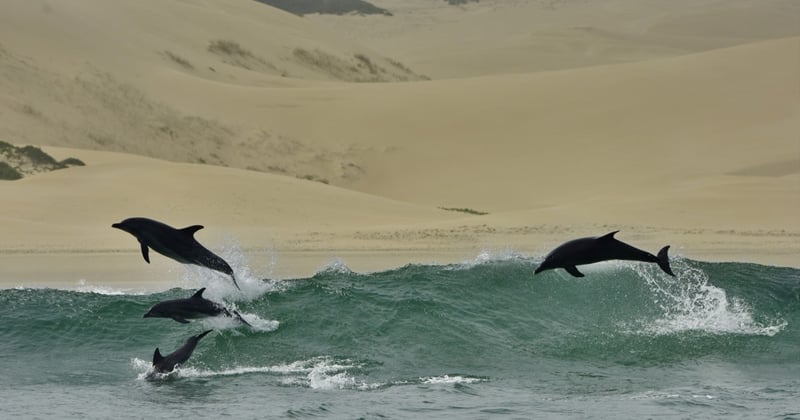
Algoa Bay in South Africa becomes a prestigious Whale Heritage Site
Press release
Algoa Bay in South Africa has been awarded the Whale Heritage Site accolade, making South Africa the only country in the world with two accredited sites.
Whale Heritage Sites are a global accreditation scheme developed by the World Cetacean Alliance and supported by World Animal Protection, that recognise a community´s commitment to respect and celebrate whales, dolphins and other cetaceans.
Algoa Bay joins four Whale Heritage Sites: Hervey Bay in Australia; Tenerife-La Gomera Marine area in Southwest Tenerife, Spain; Dana Point, California US, and the Bluff in Durban, South Africa.
With this accreditation, Algoa Bay will provide the travel industry with another way to identify and support sustainable sites and create a location for communities to celebrate marine culture, heritage and biodiversity.
Whale Heritage Site status also provides tourists with an easy way to select responsible whale and dolphin watching destinations; places where people can experience these magnificent animals in their natural habitat and in an authentic and respectful way.
Nick Stewart, Global Head of Campaigns at World Animal Protection, said:
"The accreditation of Algoa Bay as a new Whale Heritage Site is immensely important in the protection of wildlife in South Africa. It showcases a viable, sustainable alternative to cruel attractions like captive dolphin venues and other wildlife entertainment activities. The site will also help to spotlight tour operators who offer tourists a wonderful experience seeing whales and dolphins in the wild, where they belong, while protecting the welfare of marine wildlife.”
Lloyd Edwards, owner of Raggy Charters / The Baywatch Project, and a member of the site´s Steering Committee, said:
"Becoming a Whale Heritage Site will ensure that visitors to the Algoa Bay marine area are contributing to destinations that celebrate natural heritage, protect marine wildlife and build a connection between local residents and sea life. In addition to the opportunity to observe sea mammals in the ocean, to attend vibrant festivals and other events that celebrate the marine environment and provide education and inspiration for tourists and locals alike.”
Port Elizabeth, where Algoa Bay is located, is a hidden gem in South Africa for whale and dolphin watching, and other wildlife viewing. With seasonal visits from southern right whales, humpback whales and Indo-pacific humpback dolphins. They have the largest breeding colony of African penguins in the world. Other resident species include bottlenose dolphins, common dolphins, Bryde's whales and Cape gannets.
One unique aspect in Algoa Bay is the sheer number of Indo-Pacific Bottlenose dolphins, with schools of up to 800 individual dolphins encountered on marine tours. A longstanding scientific research project established since the 1990s, estimates there to be approximately 30,000 resident bottle-nose dolphins.
To qualify for this global accreditation, destinations like Algoa Bay must meet set criteria which recognises their commitment to cetacean conservation through responsible wildlife interactions and sustainability. These include:
- Encouraging respectful human-cetacean coexistence
- Celebrating cetaceans
- Environmental, social and economic sustainability
- Research, education and awareness
To meet Whale Heritage Site criteria, sites must take into account information relating to the relevant local cetacean populations, including their status, numbers, biology, habitat, behaviour and welfare. It offers the travel industry a way to protect marine wildlife and support sustainable practices.
ENDS
About Whale Heritage Sites
The Whale Heritage Site (WHS) initiative is a certification programme established by the World Cetacean Alliance (WCA) in 2015 and supported by World Animal Protection. It was announced during the first Whale Heritage Site Summit in the Azores in 2015.
WHS are outstanding locations where cetaceans (whales, dolphins, or porpoises) are embraced through the cultural, economic, social, and political lives of associated communities, and where people and cetaceans coexist in an authentic and respectful way.
Their aim is to preserve cetacean species and their habitats on a global scale so that they are around for generations to come.
The World Cetacean Alliance believes the development of a network of WHS, designated against well-developed and robust criteria, can play an important role in distinguishing areas where cetaceans and people exist in harmony.
WHS will be confined to those places where human relationships with cetaceans are positive and not exploitative.
About World Cetacean Alliance and World Animal Protection
World Cetacean Alliance (WCA) and World Animal Protection collaborate to create a world where whales and other cetaceans are only be found in the wild, where they live in harmony with people and are experienced respectfully by a responsible and protective tourism industry.”
Both organisations are working together to implement activities that that aim to end captivity and develop responsible alternatives. By doing so, they are clearing the way for a responsible whale watching industry that protects and facilitates experiencing cetaceans respectfully, in their natural habitat.
A great step towards achieving this vision is the new edition of the animal welfare guidelines of the Dutch travel trade association, ANVR. Entertainment with dolphins and cetaceans that offer direct interaction are now deemed ‘unacceptable’ by ANVR and member tour operators are advised not to offer or support these activities any longer.
The accreditation of Algoa Bay as a new Whale Heritage Site is immensely important in the protection of wildlife in South Africa. It showcases a viable, sustainable alternative to cruel attractions like captive dolphin venues and other wildlife entertainment activities.